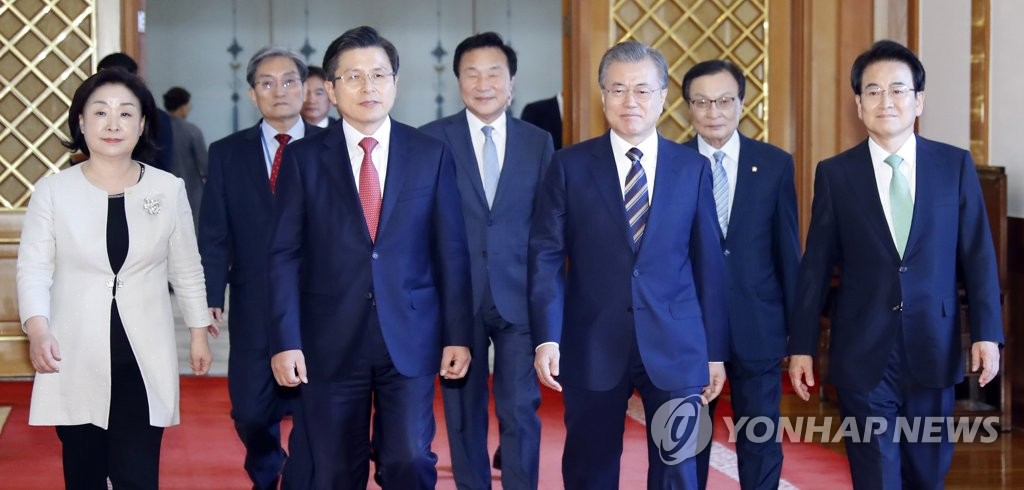President Moon Jae-in and the heads of five major political parties agreed to launch a bipartisan task force to cope with Japan's use of trade as a means of retaliation over a historical issue.
The decision came during three-hour-long talks Moon held with the ruling and opposition party leaders at Cheong Wa Dae, the first such talks in 16 months.
They "shared the perception that Japan's measure of export restrictions are unfair economic reprisal that contravenes the free trade order," the parties' spokespersons said in a joint press statement.

They urged Japan to immediately retract the stricter export control of core materials used in semiconductor and digital displays, which took effect a couple of weeks earlier.
"The government and the ruling and opposition parties agreed to establish and operate an emergency cooperation body for a pan-national response, while making efforts together to strengthen the fundamentals of the nation's economy and the competitiveness of the material/ parts/equipment industry," the statement read.
Pledging bipartisan cooperation on the matter, Moon and the party leaders made it clear that Japan's move to remove South Korea from the "white list" of trusted importers is jeopardizing not only Seoul-Tokyo ties but also security cooperation in Northeast Asia.
Tokyo is expected to announce a decision of whether to cross Seoul off the list on July 31 or Aug. 1, Chung Eui-yong, director of national security at Cheong Wa Dae, was quoted as telling the party officials.
Responding to a call for reconsidering the extension of the military information-sharing pact with Japan, Chung said the government may do so, according to future situations. He added, however, that Seoul's current position is to maintain the bilateral General Security of Military Information Agreement (GSOMIA).
President Moon Jae-in (L) takes notes as Hwang Kyo-ahn, head of the conservative main opposition Liberty Korea Party, speaks at a Cheong Wa Dae meeting in Seoul on July 18, 2019. (Yonhap)
Some of the attendees suggested that the president dispatch a special envoy to Japan. In response, Moon said it can be an option but he was cautious about timing, Cheong Wa Dae spokesperson Ko Min-jung told reporters.
"If a special envoy or high-level talks can be a solution, it's possible anytime. But an unconditional dispatch (of an envoy) is pointless. It should be discussed as a resolution at the end of negotiations (with Japan)."
In the latest stand-off between the neighboring countries, Japan is upset about South Korea's handling of a sensitive matter on compensating victims of Japan's wartime forced labor.
Moon pointed out the need for taking a lesson from the handling of the comfort women issue by South Korea's previous administration, Ko said.
"President Moon repeatedly emphasized that the most basic thing is the possibility of victims accepting (a resolution to the forced labor issue) and public consensus," Ko said.
Cheong Wa Dae spokesperson, Ko Min-jung, prepares to speak on the results of President Moon Jae-in's talks with the leaders of five major political parties, flanked by their spokespersons, on July 18, 2019. (Yonhap)
The party leaders in attendance were Lee Hae-chan of the liberal, ruling Democratic Party, Hwang Kyo-ahn of the conservative main opposition Liberty Korea Party (LKP), Sohn Hak-kyu of the center-right Bareunmirae Party, Sim Sang-jung of the progressive Justice Party and Chung Dong-young of the center-left Party for Democracy and Peace.
The six-way gathering came after months of sharp political rifts, mainly over the Moon administration's reform drive, economic policy and North Korea strategy.
The LKP chief suddenly accepted the offer to hold the group meeting with the president as Seoul bears the brunt of Tokyo's export curbs.
Contrary to Moon's intentions, the extra budget was not discussed in detail during the meeting, according to the spokesperson.
At the start of it, Moon said he hopes to focus on two urgent matters: relations with Japan and the multi-trillion-won budget bill that has been pending at the National Assembly for months.
Following the group session, Moon talked separately with the LKP chief for around 90 seconds, Ko said.(Yonhap)

